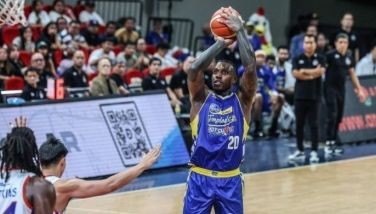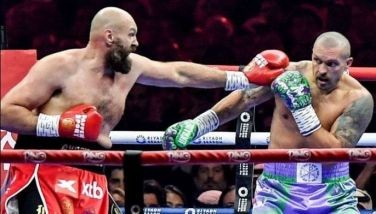The forgotten generation
Since the 1980s, being half Filipino, half foreign has become a premium in Philippine sports. Though historically, there had been hybrid Filipino athletes representing national teams before, it was only after the ‘80s that they started to become commodified. In basketball, there is obviously an abundance of Filipino-Americans. This trend took a big upswing in the late 1990s, when the Metropolitan Basketball Association allowed each team to have a maximum of two Fil-Am players. Afterwards, the PBA announced that it would allow an unlimited number of Filipino-foreign players per team. We all know that this eventually created a gap with ordinary fans, who could not aspire to be 6’9” behemoths playing professional basketball.
Since then, several pro basketball and national teams in other sports have recruited players who have one parent (predominantly the father) from Canada, France, Germany, Italy, Spain, the United Kingdom, Australia, Sweden, Switzerland, Africa and a few other territories. The belief is that size, endurance, training and predisposition give these offspring a decided advantage in athletic performance. Of course, not everyone agrees, and schools in the NCAA and UAAP have been wrestling with the issue of even allowing foreign student-athletes onto their varsity teams for the last decade. It is, putting it mildly, a ticklish issue.
But there is a forgotten sector of Philippine society that could have filled in a void in this regard, a wasted resource, as it were. There is an entire generation of half-Filipinos who have been neglected in their own country, unable to get fair treatment, growing up victims of abuse, and, all told, being neglected by the government. Estimates originally ranged from 200,000 to well over 300,000 of these marginalized in their own country. But reports from as recent as 2012 suggest there could be up to five times as many of these undocumented children of American servicemen. They are the Amerasians, derogatorily better known in some sectors as “G.I. babies”. In Vietnam, they are better known as “dust of the earth” and are treated accordingly.
Almost half a century ago, the world-renowned writer, Pearl S. Buck (“The Grapes of Wrath”) noticed a disturbing trend. In countries that hosted US military bases, servicemen were constantly leaving behind pregnant women or unwanted children. Worldwide, these unrecognized Americans have grown in number to the tens of millions over more than 70 years. They are ostracized, treated as a burden, and are a reminder of the untrue promises of US citizenship and a better life. Many of their mothers believed a concocted fantasy used to gain sexual liaisons. That is why many of the mothers abandon their children or treat them badly.
In many sports, being African-American is considered a genetic superiority. Unfortunately, in the case of Amerasians, it is quite the opposite. They are insulted, branded as inferior, even beaten. Imagine if their natural abilities were harnessed, instead. They would have powered many of our country’s national teams and catapulted us to world contender status in many sports. The Caucasian or light-skinned children, for their part, are used for their beauty. A few lucky ones manage to attract talent scouts and become singer or actors, as being mestizo is in high demand. But since most of them grow up in poor backgrounds which caused their mothers to desperately cling on to empty promises of leaving the country in the first place, the greater likelihood is that they end up bar girls or prostitutes.
The Pearl S. Buck Foundation (PSBF) Philippines has been a lonely vanguard trying to give these abandoned children a better life, finding their strengths, and trying to build on them. With offices stretched thinly over Manila, Cebu, Olongapo, Pampanga and Leyte, the foundation has been seeking sponsors and donors for decades, trying to assist with the studies and social welfare needs of these children. But, in the final reckoning, the PSBF has been hard-pressed to even meet the needs of a quarter of them. Imagine what a difference it would have made if even just a handful of them had been as fortunate in sports as PSBF beneficiary Allan Pineda Lindo, who is more commonly known as the singer Apl.de.ap. The foundation was able to link the young prodigy with a sponsor in the US who later adopted him, changing his life forever.
In 1992, after the Philippine Congress expelled the US military bases, it became more difficult for the Amerasians to find their fathers and try to get their rightful US citizenship. Now, almost a quarter of a century later, they face a new problem. Age and illness are catching up with them. And without knowledge of their paternal health histories, their illnesses and allergies are much more difficult to treat. Neither do they get any support as dependents of past or present US military personnel. A few this writer knows have been tremendously fortunate to have contacted their fathers and receive recognition, but they would be in the very small minority. And, in the interim, the number of Eurasian children sired by tourists has started growing, creating a whole new set of problems.
This is the great irony of it all. While we spend fortunes seeking out Filipinos born and raised abroad, we have a great source of raw athletic ability here, and they need it more. If only we were more willing to invest in their development, the children and grandchildren of these forgotten Filipinos among us would be able to get free education, live healthier lives, and be productive members of society. If only we could see what was right in front of us, even if, at first glance, they don’t have the same brown skin.
- Latest
- Trending




























